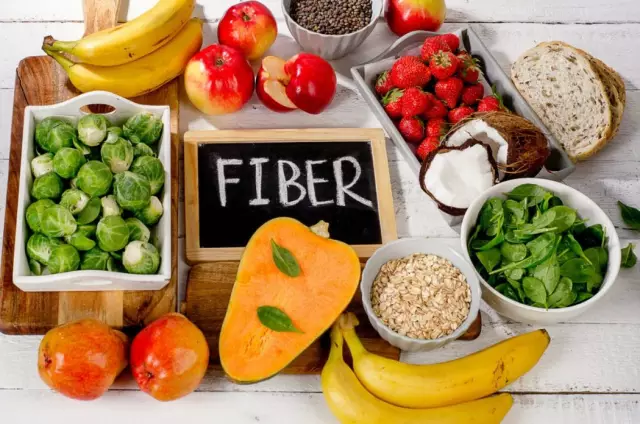- Author Rachel Wainwright wainwright@abchealthonline.com.
- Public 2023-12-15 07:39.
- Last modified 2025-11-02 20:14.
6 reasons to add fiber to your diet
We live in an era of rapid introduction of scientific and technological advances into everyday life. This has a very noticeable effect on everyday life: every year there are devices that make it easier for housewives to do housework. In particular, the arsenal of kitchen equipment is constantly being updated, which increases the efficiency of food processing.

Source: depositphotos.com
On the one hand, this process can be considered positive: varied and tasty food becomes available to anyone. On the other hand, modernization of this kind is also harmful: the share of raw vegetables and fruits, whole grains and unrefined cereals in the diet of most city dwellers is rapidly decreasing, and along with it the consumption of fiber, which is necessary for the normal functioning of the body, decreases.
Fiber includes those carbohydrates of plant origin that are not destroyed by the action of digestive enzymes, but are processed by the beneficial intestinal microflora. These are mainly coarse plant tissues: seed peel, fruit pulp, fibrous parts of leaves, pods. This article focuses on the health benefits of fiber.
Weight normalization
Fiber has an interesting property: when it gets into the stomach, it swells quickly. In this case, the brain receives a signal that the stomach is full (and, therefore, the person is full) within a few minutes after the start of the meal. By adding foods high in fiber to your diet, you can significantly reduce the calorie content of your food without feeling hungry.
Equally important is the fact that fiber slows down the absorption of nutrients, preventing excess weight gain.

Source: depositphotos.com
Maintaining gut health
Soluble types of fiber (pectins, gums, hemicellulose), entering the intestines, turn into a viscous jelly. This substance coats the walls of the digestive tract, protecting them from the effects of digestive enzymes and acids. Eating a lot of fiber reduces the risk of developing diseases such as colitis, diverticulosis, and bowel cancer.
In addition, beneficial bacteria that live in the human intestine feed on fiber. If there are enough such substances, the vital activity of these microorganisms is activated, which prevents the growth of colonies of pathogenic microflora. By enriching your diet with fiber, you can avoid the problems associated with inflammatory processes in the intestines.

Source: depositphotos.com
Prevention of hemorrhoids
Insoluble fiber (lignin and cellulose) has a mild laxative effect. Its consumption contributes to a quick and effective bowel cleansing, reduces the likelihood of constipation.
A diet high in fiber is considered an excellent way to prevent hemorrhoids.

Source: depositphotos.com
Stabilizing blood sugar
Eating foods high in fiber slows down the absorption of carbohydrates in the intestines. This is very important for patients with diabetes mellitus: this mode eliminates the need to produce high doses of insulin.
Fiber is processed in the intestines. In this case, carbohydrates are also formed, but their absorption does not lead to an increase in blood glucose levels. Eating fiber is much safer for your health than including refined sugar in your diet.

Source: depositphotos.com
Protection against heart disease
Fiber also slows down the absorption of fats, helping to normalize cholesterol levels. This helps to maintain the elasticity of the walls of blood vessels, prevents the development of ischemic or hypertension, myocardial infarction and stroke.
Recent studies have found that a daily intake of 200 g of fiber-rich fruit pulp reduces the risk of death from cardiovascular diseases by almost half.

Source: depositphotos.com
Improving skin condition
Experts say that the condition of the skin directly depends on the activity of the beneficial intestinal microflora. Regular consumption of fiber helps to suppress the vital activity of pathogenic bacteria and fungi, and reduces the risk of developing inflammatory diseases. This helps to maintain healthy skin color, tone, and normalizes the sebaceous glands.

Source: depositphotos.com
Legumes (asparagus and white beans, green peas, etc.) contain the maximum amount of fiber. There is a lot of it in cabbage (cabbage, broccoli and cauliflower), pulp of fruits and vegetables, nuts and seeds, the surface layer of seeds of cereal plants.
To provide the body with fiber, it is necessary to eat raw fruits and vegetables whenever possible. Preference should be given to whole grain cereals, bread made from wholemeal flour made from unrefined grain, juices with pulp. You should not get carried away with cereals that do not require cooking, or cereals that have undergone preliminary heat treatment: the fiber that was initially contained in them is largely destroyed. It is important to include dishes with beans, peas or lentils on the menu at least three times a week.
The daily fiber requirement of an adult is about 35 g. According to statistics, a modern city dweller does not receive even a third of this amount. This situation is extremely harmful, but everything can be fixed: pay attention to your diet and add healthy plant foods to it. It does not require much effort and unnecessary expense and will bring real benefits to your health.
YouTube video related to the article:

Maria Kulkes Medical journalist About the author
Education: First Moscow State Medical University named after I. M. Sechenov, specialty "General Medicine".
Found a mistake in the text? Select it and press Ctrl + Enter.






